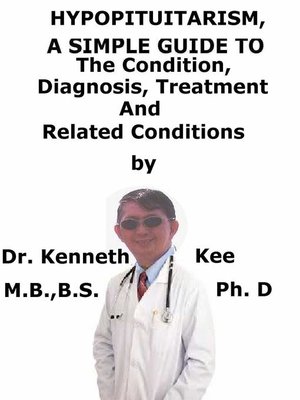Hypopituitarism, a Simple Guide to the Condition, Diagnosis, Treatment and Related Conditions
ebook
By Kenneth Kee

Sign up to save your library
With an OverDrive account, you can save your favorite libraries for at-a-glance information about availability. Find out more about OverDrive accounts.
Find this title in Libby, the library reading app by OverDrive.



Search for a digital library with this title
Title found at these libraries:
| Library Name | Distance |
|---|---|
| Loading... |
Hypopituitarism is a medical disorder in which the pituitary gland does not normally produce usual amounts of some or all of its eight hormones.
Hypopituitarism is due to an inadequate production of hypothalamic-releasing hormones or due to an inability of the pituitary gland to secrete hormones.
Hypopituitarism is typically chronic and lifelong unless successful surgery or medicinal therapy of the underlying cause can restore pituitary function.
Causes
In hypopituitarism, there is a loss or decrease of one or more pituitary hormones.
Decrease of a hormone results in loss of function in the gland and the hormonal regulation.
Loss of TSH results in loss of function of the thyroid gland.
1.Brain surgery
2.Brain tumor
3.Head trauma
4.Infections or inflammation of the brain and the tissues that support the brain
5.Radiation therapy
6.Stroke
Sometimes, hypopituitarism is due to abnormal immune system or metabolic diseases, such as:
1. Hemochromatosis
2. Histiocytosis X
Symptoms
The patient presents with endocrine dysfunction:
A.Adrenocorticotrophic hormone (ACTH) deficiency:
1.Chronic: fatigue, pallor, anorexia, weight loss.
2.Acute: weakness, dizziness, nausea, vomiting, fever, shock.
3.Children: delayed puberty, failure to thrive.
4.Hypoglycemia, hypotension, anemia, lymphocytosis, hyponatremia.
B.Thyroid-stimulating hormone (TSH) deficiency:
1.Tiredness, cold intolerance, constipation, hair loss, dry skin, cognitive slowing.
2.Weight gain, bradycardia, hypotension.
3.Children: delayed development, growth restriction, intellectual impairment.
C Gonadotrophin deficiency:
1.Women: oligomenorrhea, loss of libido, dyspareunia, infertility, osteoporosis.
2.Men: loss of libido, loss of facial, scrotal, and body hair, mood impairment, reduced muscle mass, osteoporosis, anemia.
3.Children: delayed puberty.
D.Growth hormone deficiency:
1.Reduced muscle mass and strength, visceral obesity, impairment of attention, memory.
2.Dyslipidemia, premature atherosclerosis.
3.Children: growth restriction.
E.Antidiuretic hormone deficiency:
1.Polyuria, polydipsia.
2.Reduced urine osmolality, hypernatremia.
3.May also present with features due to the underlying cause:
a.Space-occupying lesion: headaches or visual field deficits.
b.Large lesions affecting the hypothalamus: polydipsia and inadequate secretion.
Diagnosis:
To diagnose hypopituitarism, there must be low hormonal amounts from the pituitary gland.
1.Serum ACTH
2.Serum cortisol
3.Serum estradiol
4.Serum follicle stimulating hormone
5.Serum insulin-like growth factor 1
6.Serum luteinizing hormone
7.Serum testosterone level
8.Serum thyroid stimulating hormone
9.Thyroid hormone
10.Brain CT scan
11.Pituitary MRI
Treatment
Acute resuscitation, such as intravenous fluids, may be needed
If hypopituitarism has been caused by a tumor, pituitary function may be returned to normal after successful surgical or medical removal of the lesion.
Surgical:
In pituitary stroke or coma, immediate operative decompression may be life-saving.
Removal of macroadenomas may be needed if they do not respond to medical therapy.
If hypopituitarism is caused by a tumor, you may require surgery to excise the tumor.
Radiation therapy may also be needed
Medical care consists of hormone replacement as appropriate and treatment of the underlying cause.
The patient will need lifelong hormone medicines to replace hormones that are no longer made by glands under the...







